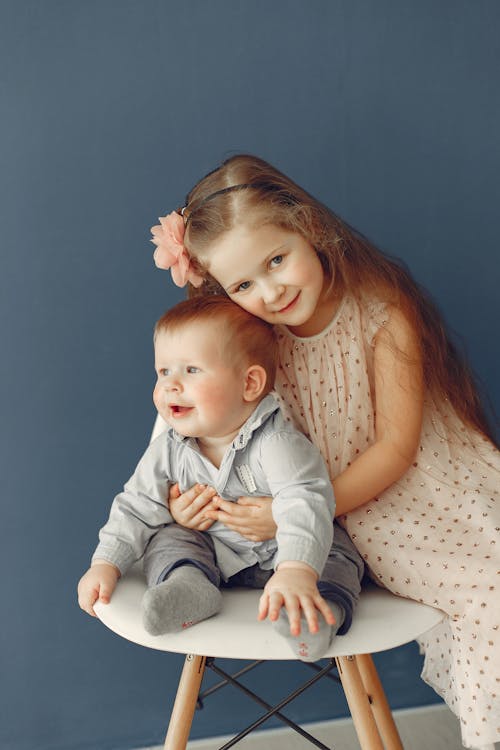Welcoming a new-born is an exciting and challenging time in any family’s life. There is lots of change and upheaval but also a lot of emotion and commotion.
And while for parents, all that activity can be exciting, for children who are already in the family, it can be disruptive and worrying. There is a danger of inciting jealousy or other bad behaviour and it can nearly feel like they’re reverting back to a younger state, with toilet trained children wetting themselves, or older children throwing tantrums, wanting to be lifted or even bottle-fed again.
The way that we begin to introduce the idea od this new family member to our children is very important and can mean the difference between a smooth transition and bumpy one. It’s important to start introducing the idea early in the pregnancy, to involve them and to help them to manage their emotions, whether that’s through classes or by handle it directly as a family.
Because every child is different, they will not all react in the same way to the announcement of the arrival of a new child. But there are some tips and tricks available for dealing with the different age groups’ reactions to the new baby.
5+ School-going older children

This group encompasses ages five and above, so those at a school-attending age. Generally, these children will not feel threatened by the baby in the ways that younger children might, but the divided attention of their parents could easily make them jealous. Some key areas to look at are;
Making sure they understand what’s happening
Use language they understand to explain what changes will be happening – good and bad. Explain in child-friendly terms about the pregnancy and how the baby will have different needs to them.
Get them involved
One of the best ways to prepare them is to make them part of your pregnancy journey. Talk to them about the baby, things like names, the colours in the nursery, read stories about brothers and sisters and visit with friends who have babies so they can get used to being around them.

Pay attention to them
While it’s important to talk about baby and the coming changes, let them know that not everything will change, and that you will be just as invested in them, their hobbies and their lives as you are now. Spend some time each day with just them, to remind them how special they are, playing a game or having a chat. Keeping it one on one is key, as is keeping them to their routine.
Make some changes beforehand
If there are big changes that need to happen, like the sibling having to move rooms or bring a cot into their room, then it’s best that this happens well before baby arrives, so there’s no resentment or too much upheaval all at once, Give them a chance to get used to these changes.
Talk about being an older sibling
Let them know about their new role in the family and how exciting it will be. They can be the person their sibling will look up to, they can be good at looking after the baby, and older siblings gets a later bedtime than younger ones.
Once baby arrives…
Bring the sibling to the hospital to meet them if possible, to help them feel as involved as possible and part of the family, rather than having the newborn suddenly arriving in their space. Maybe have the newborn ‘bring them a gift’ to build good feeling. Let them be as involved as they want to be. You may want them to be best friends straight away but forcing them together doesn’t always work and can make the older sibling feel pressured but praise them when they play and interact with baby gently. Try to keep the family in as normal and routine as possible and talk to the older sibling when feeding or changing nappies so as to not exclude them. I fit doesn’t click straight away, it’s not the end of the world. Give them a little time, and if their behaviour escalates and you’re concerned, contact you GP.
2-4 Pre-schoolers

This age group are still relatively attached to you and jealousy is more likely in this ages group. Sharing attention is not their forte so it’s important to explain well ahead of time that baby will attention and care and that a lot of changes will be happening. They ae still learning to share so this will be a steep learning curve.
Break the news slowly
Unlike the 5 and up category, it’s best to wait a little while before telling a pre-schooler. When you start to buy furniture or if they ask about your growing stomach, then might be the time to explain what’s happening. Tell them before they hear the news from someone else. Picture books are great for explaining for this age group.
Prepare them for changes
Let them know it will be fun and the baby will be a new friend and source of excitement, but also that they will cry, require lots of attention and may annoy them sometimes and that baby won’t be able to play for a little while. Reassure them that although lots will change, you will love them just as much. Let them know that going to the hospital means you’ll be coming back with the baby, so as not to catch them off guard and be sure they are prepared for the arrival of the baby in the home.

Use toys to involve them
This age group won’t be as easy to get involved in the planning and pregnancy aspect of things, but toys are a handy halfway point. When kitting out baby’s nursery, allow them to help you pick pout toys for baby and let them play with them a little beforehand. Getting this age group baby dolls for boys and girls can be great for teaching them how to be gentle and caring for when baby comes and let them understand why you need to give them so much care and attention.
Be strategic with change
A baby is a huge and often overwhelming change in a child’s life. So, when that change lines up with starting or finishing preschool, potty training or switching from crib to bed, it can feel like too much and result in behavioural issues. Try to get them done well before baby arrives or give it time to let baby settle in before tackling them. It’s not always something we can control, like with school, but every little helps.
Attention
Your child may revert to some behaviours you thought they were past at this point and that’s totally normal. Acting like they need help with things that they don’t is their way of getting attention. Instead, praise ‘grown up’ behaviour and encourage dad to spend lots of time with the older child. This can be a great opportunity for them to bond while you’re feeding. It is also important to set aside time for this age group, one on one, whether it’s a game or a chat or even just a cuddle. If you have visitors for baby, ask them to pay attention to your older child too, asking them how it is to be a sibling and also questions not about the baby.
Two and under - Toddlers

This age group likely won’t fully understand what is happening yet when a new sibling is on the way. Let them understand that it’s an exciting event, using your tone and words. They may not understand why ‘new baby’ is exciting but knowing you’re excited about it will rub off on them.
Picture books
As important as they are for pre-schoolers, they are essential for this age group, who will need pictures and repetition to understand concepts like ‘sister’, ‘brother’, and ‘new baby’.
Attention
Again, it’s important to reassure them that they are loved and spending one on one time with them. Have dad, or grandma or another close adult bring them somewhere fun or special for a treat and have the baby give them a gift that shows them they are a friend.








